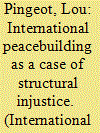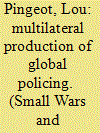| Srl | Item |
| 1 |
ID:
172164


|
|
|
|
|
| Summary/Abstract |
In the face of the repeated failure of international peacebuilding to build peace, one strand of the literature argues that failure can only be understood by ‘zooming in’ – by focusing on peacebuilders, the local populations they purport to help, and the relationship between them. This article draws on the insights of this literature to argue that international peacebuilding should be understood as an instance of structural injustice. Studies of the encounter between international interveners and local populations tend to focus on the differences between these groups and their problematic relationship. I argue that ‘zooming in’ reveals much more than the differences between interveners and locals: it uncovers how their relationship presents parallels and similarities with others, such as the relation between colonizers and colonized. The relationship between internationals and locals is problematic not because of each group’s characteristics and their difference, but because of the social positions they relate from. These hierarchical social positions give some groups the power to intervene in the lives of others. The article argues that the encounter between internationals and locals should be ‘de-exoticized’ and that hierarchy, rather than difference, should be at the centre of the critical peacebuilding literature.
|
|
|
|
|
|
|
|
|
|
|
|
|
|
|
|
| 2 |
ID:
185079


|
|
|
|
|
| Summary/Abstract |
This article argues that UN peace operations play a central role in the nexus between policing and counterinsurgency, and constitute one of the underappreciated sites and circuits of counterinsurgent knowledge. It posits that the convergence between peace operations and counterinsurgency has been driven not only (or even primarily) by these mission’s more assertive military posture under ‘stabilization’, but also by the turn to ‘polickeeping’, the growing role of police forces and increasing importance of policing tasks in peacekeeping. The stabilization/policekeeping mindset rests on the assumption of a continuum from minor instances of disorders to full-blown armed conflict, leading to an expansive understanding of what may constitute a threat to stability and require international intervention. The articles teases out the macro and micro manifestations of this mindset through the lens of UN peace operations’ response to civil unrest and demonstrations. It shows that, because peace operations are a point of cross-fertilization for the creation and transmission of global policing practices, UN protest policing reverberates beyond the specific countries in which peace operations are deployed. Peace operations create a global demand for and supply of specific skills and tools, in particular paramilitary police forces.
|
|
|
|
|
|
|
|
|
|
|
|
|
|
|
|
| 3 |
ID:
189901


|
|
|
| 4 |
ID:
161272


|
|
|
|
|
| Summary/Abstract |
This article develops an International Practice Theory (IPT) approach to United Nations peace operations through the study of the UN Stabilization Mission in Haiti (MINUSTAH). MINUSTAH saw the introduction of new practices within the context of a UN peace operation, namely the use of joint military-police forces to conduct offensive action against armed groups that were labelled as ‘gangs’. While more objectivist problem-solving approaches would argue that the UN mission was simply adapting to the situation on the ground, an IPT lens reveals that there was considerable struggle to integrate these new practices within the repertoire of peacekeeping. The article argues for the benefits of applying an IPT lens to peace operations while proposing to develop theoretical and methodological approaches that have been less prominent in IPT. Theoretically, it posits that IPT can better articulate practice and discourse by paying more attention to what actors say about what they do.
|
|
|
|
|
|
|
|
|
|
|
|
|
|
|
|